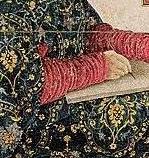Presents From My Aunts in Pakistan is a loosely strung together sequence of personal memories, which begin with the narrator receiving ‘exotic’ gifts from her aunts, describing in detail the saris and ‘candy striped’ bangles, but moving away from that focus to the girl’s feelings about her mixed heritage: ‘alien in the sitting-room.’
The poem is written in free verse, in seven stanzas of varying length. The layout helps to give a sense of the girl’s confusion, and breaks at points to emphasize the conflict in her mind, memories that take her back to the story of the beginning: ‘how the three of us/sailed to England.’ The language used is simple, and has the tone of someone thinking out loud, but it is also often symbolic, tying the disparate ‘memories’ that make up the whole together.
The colours of the presents are described in great detail, using imagery such as 'glistening like an orange split open.' While their beauty is emphasized, there is a suggestion of the strange threat the gifts carry: the bangles ‘snapped, drew blood.’ The girl feels she cannot become accustomed to the identity the clothes put on her, as ‘they’ expect, perhaps.
The sibilants used in the second stanza mimic the sound of ‘satin’: ‘silken’ ‘sitting’, and as the girl tries on the clothes, she realizes: ‘I could never be as lovely.’ The gifts make her feel uncomfortable and conflicted. The tone of ‘like at school, fashions changed in Pakistan’ seems slightly ironic, as if she is wryly underlining how little there is in common between the two. Later on, she returns to this disparity she perceives between the two cultures she is part of, as her friend, unimpressed by the ‘radiant’ salwar kameez, asks to see her ‘weekend clothes’.
The narrator herself, while caught by the beauty of the presents, cannot accept what they mean. She ‘longed/for denim and corduroy.’ The enjambment here emphasizes her feeling – the clothes are now a ‘costume’. They turn her into something else, and like the bangles that draw blood, they are dangerous, they burn: ‘my costume clings to me/and I was aflame’. She is caught in the flames ‘half-English/unlike Aunt Jamila.’
The narrator suddenly changes direction, speaks of something else as if she no longer wants to think about the presents, which she hides away, ‘radiant in the wardrobe’. She switches on her parent’s camel skin lamp. And she returns to her ‘costume’, considering ‘the cruelty/and the transformation’. The alliteration here of ‘s’ and ‘c’ links the stanzas together, and then the simile ‘like stained glass’ gestures back to the ‘candy-striped glass bangles’ and forward, to the ‘mirror-work…minature glass circles’ in the salwar kameez.In the fourth stanza the word there is another sudden shift, the girl thinks of the jewellery her mother sherished, the Indian gold ‘dangling, filigree.’ The caesura here creates a sense that the word is left dangling in the middle of the sentence. Abruptly, the narrator changes tone from desrciptive and musing, to brusque: 'stolen from our car.' Similarly, she uses contrast to show the difference in values, in attitudes, towards her ‘costume’: 'My aunts requested cardigans/From Marks and Spencer', while they sent her apple-green sari’s she hid away in the wardrobe.
In the fifth stanza, the narrator begins to try to see the clothes as hers, no longer a costume. She admires the mirrorwork, but also, symbolically, tries to see herself in it. The layout here captures the action of trying 'to glimpse myself/ in the minature/ glass circles.'
Her memories draw her back to the real beginning, and she remembers playing with a tin boat, and the ship they sailed in – in remembering the mind drifts from image to image. The girl pictures her birthplace from photographs, she has not been back, but she imagines herself there, watching her aunts 'in shaded rooms/screened from male visitors/sorting presents.' We have come full circle.
Here finally, the narrator can pause to consider the whole. It is clear that while she feels drawn to the beauty of her presents, she feels 'alien' in satin and silk, she feels as if she has put on a false skin, which burns her and we are reminded of a phoenix, as she says she 'couldn’t rise up out of it’s fire.'
When she tries to see herself in the mirrorwork, she tries to identify herself, on some level, with the glistening ‘costume’ she has on, and she remembers why and how she is here, yet her sense of isolation is still there 'found myself alone.'
As she grows up, she feels both distanced from her country, and close to it, feeling and imagining it, ‘a fractured land/throbbing through newsprint.’ ‘Throbbing’ reminds us of the heart, of love and blood, hinting at the narrator’s closeness to this land, while also suggesting the danger of it ‘fractures’ ‘split open’, like the bangles that ‘snapped’.
In the end, the narrator places herself in her country: there, in Pakistan, at the Shalimar Gardens. Yet she is still distant, ‘staring through the fretwork’. The pattern here is linked to the clothes, the filigree jewellery, intricate and connected, difficult to see through, like the stained glass effect of the camel skin lamp.
She looks through the fretwork at beggar girls, sweeper girls, who have an identity, though they have nothing more, and sees herself: ‘of no fixed nationality.’This last sentence is again deliberately ironic, reminiscent of the ‘of no fixed abode’ used in courts when the defendant is homeless.

